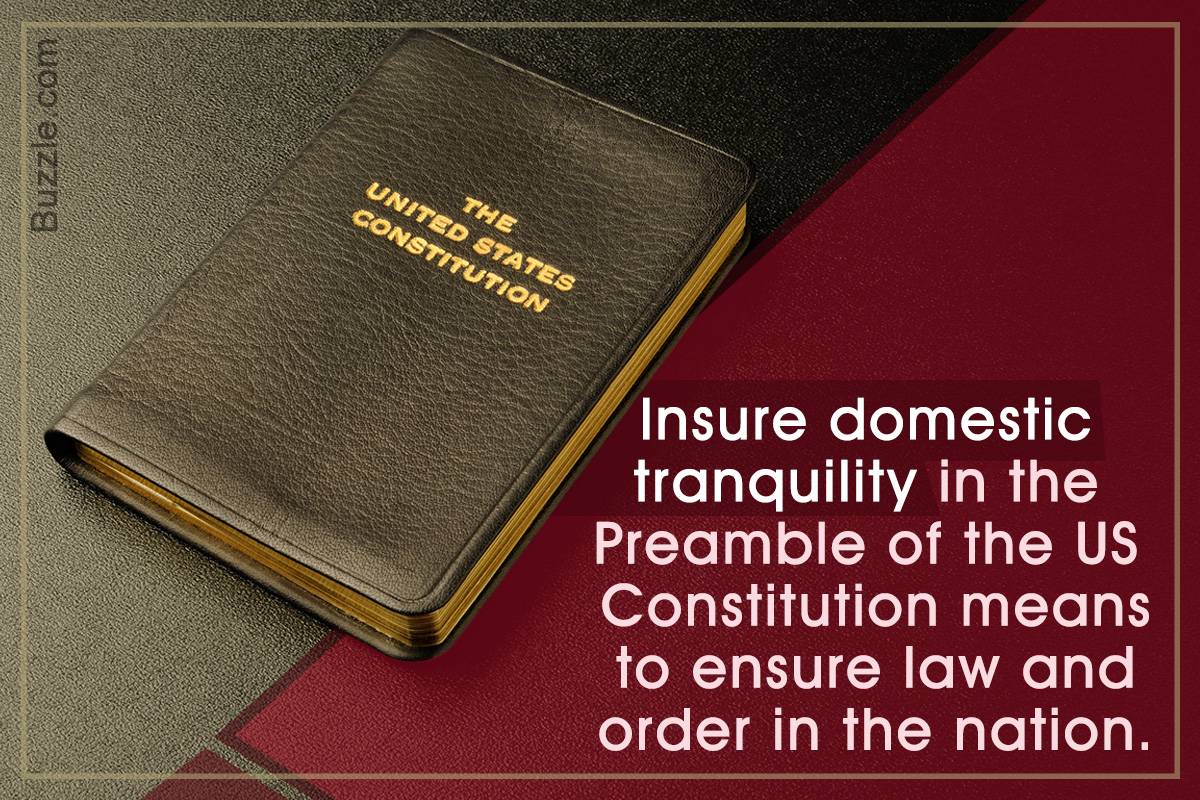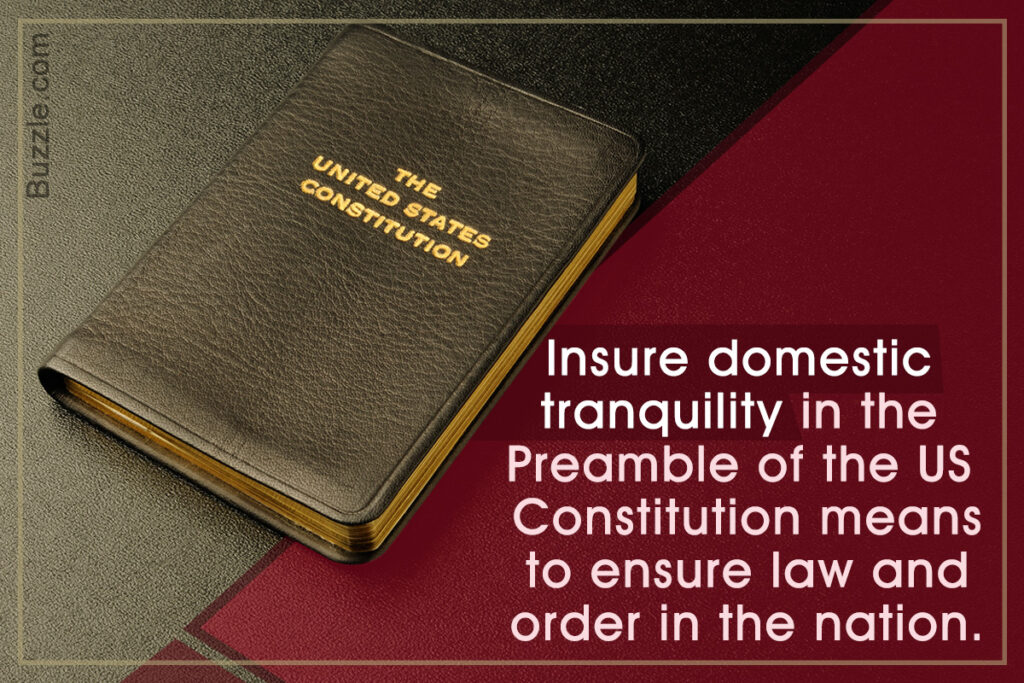Historical Context
The phrase “domestic tranquility” in the Preamble of the U.S. Constitution holds significant historical importance. It encapsulates the Founding Fathers’ aspiration for a peaceful and stable nation.
The Revolutionary Era
The American Revolution was a tumultuous period marked by political unrest and armed conflict. The colonists’ desire for independence from British rule stemmed from grievances over taxation, representation, and the suppression of their rights. This struggle for self-governance fueled the colonists’ determination to create a nation where they could live in harmony and security.
Definition and Scope
The term “domestic tranquility” is central to the Preamble of the United States Constitution, which sets forth the fundamental purposes and goals of the government. It refers to the state of peace, order, and security within the nation, free from internal disturbances or threats.
Throughout American history, the interpretation of “domestic tranquility” has evolved to reflect changing social and political contexts. In the early years of the Republic, it primarily focused on maintaining order and suppressing internal dissent. However, over time, the concept has expanded to encompass a broader range of issues, including social justice, economic equality, and environmental protection.
Modern Interpretations
In modern times, “domestic tranquility” is often understood as a state of well-being and harmony within the nation, where citizens feel safe, secure, and free to pursue their aspirations. It encompasses not only the absence of violence and conflict but also the promotion of social and economic conditions that contribute to a peaceful and prosperous society.
Role of Government
The federal government plays a crucial role in ensuring domestic tranquility by maintaining peace and order within the country. It employs various methods to achieve this, including:
Enforcement of Laws
The government enforces laws and regulations to deter and punish criminal activity, ensuring the safety and security of citizens.
Establishment of Law Enforcement Agencies
Federal agencies like the Federal Bureau of Investigation (FBI) and the Drug Enforcement Administration (DEA) investigate and prosecute crimes that transcend state boundaries, contributing to national security.
Military Intervention
In cases of civil unrest or emergencies, the government may deploy military forces to restore order and protect citizens.
Disaster Relief
The government provides disaster relief and assistance in the aftermath of natural disasters, such as hurricanes and earthquakes, to maintain stability and support affected communities.
Promotion of Social Welfare
Government programs aimed at improving social welfare, such as healthcare, education, and housing assistance, can contribute to reducing crime and fostering a sense of community.
Challenges and Threats

Domestic tranquility in the United States has faced numerous challenges and threats throughout history. These include internal conflicts, external threats, and natural disasters.
Internal Conflicts
Internal conflicts have been a major source of disruption to domestic tranquility in the United States. These conflicts have included civil wars, labor strikes, and racial violence.
- The American Civil War (1861-1865) was the most destructive conflict in American history, resulting in the deaths of over 600,000 people.
- The labor strikes of the late 19th and early 20th centuries often led to violence and property damage.
- Racial violence has been a persistent problem in the United States, with major outbreaks occurring in the 1920s, 1960s, and 1990s.
External Threats
External threats have also posed a challenge to domestic tranquility in the United States. These threats have included wars, terrorist attacks, and natural disasters.
- The United States has been involved in numerous wars, both within and outside of its borders.
- The terrorist attacks of September 11, 2001, were the deadliest terrorist attacks in American history.
- Natural disasters, such as hurricanes, earthquakes, and floods, have also caused widespread damage and disruption in the United States.
Citizen Responsibilities
Citizens play a vital role in maintaining domestic tranquility. They have the responsibility to uphold the rule of law, actively participate in civic life, and foster an environment of mutual respect and tolerance.
Civic engagement is crucial for a healthy society. It allows citizens to have a say in their governance, hold their leaders accountable, and contribute to their communities. By participating in elections, serving on juries, or volunteering for local organizations, citizens can directly shape the policies and decisions that affect their lives.
Tolerance and respect for the rule of law are essential for maintaining social harmony. Citizens must respect the rights and beliefs of others, even if they disagree with them. They must also obey the laws and regulations that govern their society, as they provide a framework for peaceful coexistence and protect individual rights.
Importance of Education
Education plays a significant role in fostering responsible citizenship. It equips citizens with the knowledge and skills necessary to participate effectively in civic life. Through education, citizens learn about their rights and responsibilities, the history and principles of their country, and the importance of respecting diverse perspectives.
Promoting Dialogue and Understanding
To maintain domestic tranquility, it is crucial to promote dialogue and understanding among different groups within society. This can be achieved through initiatives that bring people together, such as community events, interfaith gatherings, and educational programs. By fostering open and respectful communication, citizens can build bridges between different perspectives and work towards common goals.
Global Implications
Domestic tranquility serves as a cornerstone for the United States’ international relations, fostering stability and cooperation abroad. When the nation is at peace within its borders, it can more effectively engage with the global community and promote its interests.
The promotion of domestic peace contributes to global stability by reducing the likelihood of conflict and war. A nation that is internally stable is less likely to be drawn into international disputes or become a source of regional instability. By maintaining domestic tranquility, the United States can help prevent the spread of conflict and promote peace and security around the world.
Domestic peace also enables the United States to play a more active and influential role in international organizations and forums. When the nation is not preoccupied with internal strife, it can devote more resources and attention to global affairs. This allows the United States to engage in diplomacy, provide humanitarian assistance, and promote its values and interests abroad.
Furthermore, domestic tranquility fosters cooperation and partnership with other nations. When the United States is at peace, it can build stronger relationships with its allies and partners, based on mutual respect and shared interests. This cooperation can lead to joint initiatives, economic partnerships, and cultural exchanges, benefiting both the United States and the global community.
In conclusion, domestic tranquility is essential for the United States’ global leadership and influence. By promoting peace and stability within its borders, the nation can contribute to a more peaceful and prosperous world.
Comparative Perspectives
Various countries adopt diverse approaches to maintaining domestic tranquility. Comparing these approaches can provide insights into the effectiveness of different strategies.
Legal Frameworks
Legal frameworks play a crucial role in establishing and enforcing norms that promote domestic tranquility. In the United States, the Constitution’s Bill of Rights guarantees individual freedoms, while laws such as the Patriot Act balance security with civil liberties.
In contrast, some countries employ stricter legal measures, such as increased surveillance or restrictions on dissent. These measures may be justified in certain circumstances, but they can also lead to human rights concerns.
Government Policies
Government policies can significantly impact domestic tranquility. In the United States, social welfare programs and economic policies aim to address poverty and inequality, which can be sources of social unrest.
In other countries, governments may prioritize stability over individual freedoms. This can lead to policies that restrict dissent or suppress political opposition.
Societal Norms
Societal norms shape how individuals interact with each other and contribute to a sense of community. In the United States, a strong tradition of civic engagement and volunteerism fosters social cohesion.
In contrast, some societies may emphasize obedience to authority or conformity, which can stifle individual expression and dissent.
Current Events
Domestic tranquility in the United States has faced several challenges in recent years, including political polarization, racial tensions, and economic inequality.
The government’s response to these challenges has varied, with some initiatives aimed at promoting dialogue and understanding, while others have been criticized for exacerbating tensions.
Political Polarization
Political polarization in the United States has intensified in recent years, with both major parties becoming increasingly entrenched in their positions.
- This polarization has made it difficult to find common ground on important issues, and has led to gridlock in Congress.
- The spread of misinformation and disinformation on social media has further exacerbated polarization, as people are increasingly exposed to information that confirms their existing beliefs.
Racial Tensions
Racial tensions in the United States have also been on the rise in recent years, fueled by a number of factors, including police brutality, economic inequality, and the rise of white nationalism.
- The deaths of unarmed Black men and women at the hands of police have sparked widespread protests and calls for police reform.
- Economic inequality has also contributed to racial tensions, as Black and brown communities have been disproportionately affected by poverty and unemployment.
- The rise of white nationalism has further exacerbated racial tensions, as white supremacists have become more vocal and organized.
Economic Inequality
Economic inequality in the United States has also been on the rise in recent years, with the gap between the rich and the poor growing wider.
- This inequality has led to a decline in social mobility and has made it difficult for many Americans to achieve economic success.
- The government has taken some steps to address economic inequality, such as raising the minimum wage and expanding access to healthcare, but more needs to be done.
Future Considerations
As the United States navigates an increasingly complex and interconnected world, domestic tranquility faces a range of potential challenges that require proactive and innovative strategies to address.
The rise of social media and the spread of misinformation and disinformation pose a threat to public discourse and the ability to reach consensus on important issues. Economic inequality and disparities in access to healthcare and education can lead to social unrest and undermine the sense of shared prosperity.
Addressing Economic Disparities
Addressing economic disparities requires a comprehensive approach that includes policies to promote job creation, increase wages, and provide affordable housing and healthcare. Investing in education and skills training programs can equip individuals with the tools they need to succeed in the modern economy.
- Expanding access to affordable healthcare and housing through programs like Medicaid expansion and affordable housing initiatives.
- Investing in education and skills training programs to prepare individuals for in-demand jobs.
- Promoting job creation through tax incentives for businesses and supporting entrepreneurship.







